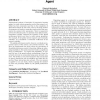Free Online Productivity Tools
i2Speak
i2Symbol
i2OCR
iTex2Img
iWeb2Print
iWeb2Shot
i2Type
iPdf2Split
iPdf2Merge
i2Bopomofo
i2Arabic
i2Style
i2Image
i2PDF
iLatex2Rtf
Sci2ools
115
click to vote
ATAL
2010
Springer
2010
Springer
Using graph analysis to study networks of adaptive agent
Experimental analysis of networks of cooperative learning agents (to verify certain properties such as the system's stability) has been commonly used due to the complexity of theoretical analysis in such cases. Due to the large number of parameters to analyze, researchers used metrics that summarize the system in few parameters. Since in cooperative system the ultimate goal is to optimize some global metric, researchers typically analyzed the evolution of the global performance metric over time to verify system properties. For example, if the global metric improves and eventually stabilizes, it is considered a reasonable verification of the system's stability. The global performance metric, however, overlooks an important aspect of the system: the network structure. We show an experimental case study where the convergence of the global performance metric is deceiving, hiding an underlying instability in the system that later leads to a significant drop in performance. To exp...
Artificial Intelligence | ATAL 2010 | Global Metric Improves | Global Performance Metric | Intelligent Agents |
Related Content
| Added | 08 Nov 2010 |
| Updated | 08 Nov 2010 |
| Type | Conference |
| Year | 2010 |
| Where | ATAL |
| Authors | Sherief Abdallah |
Comments (0)

